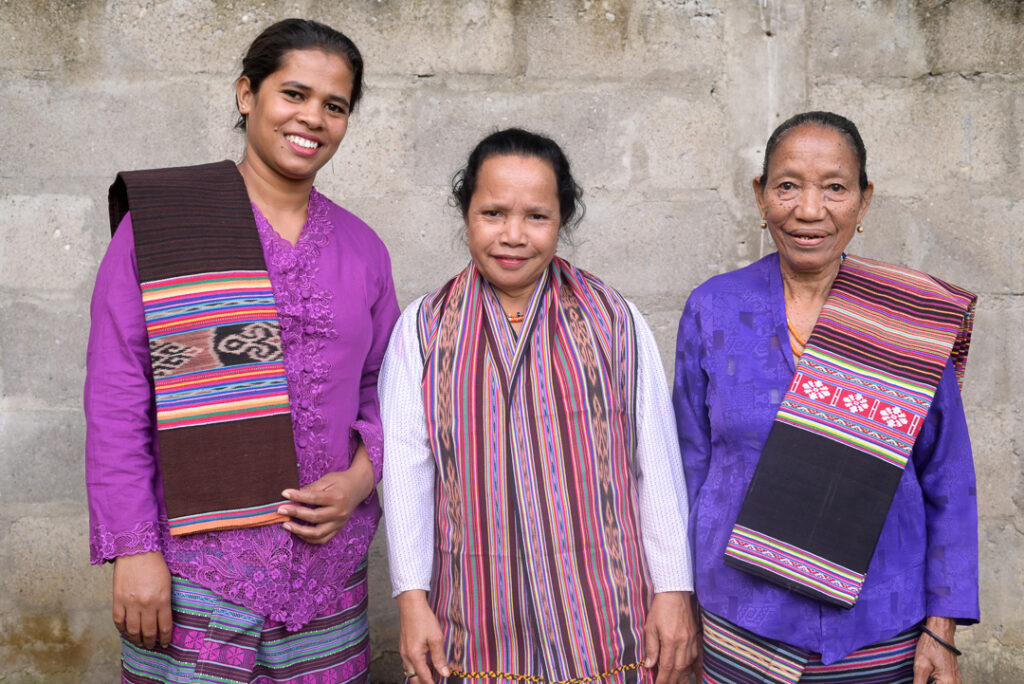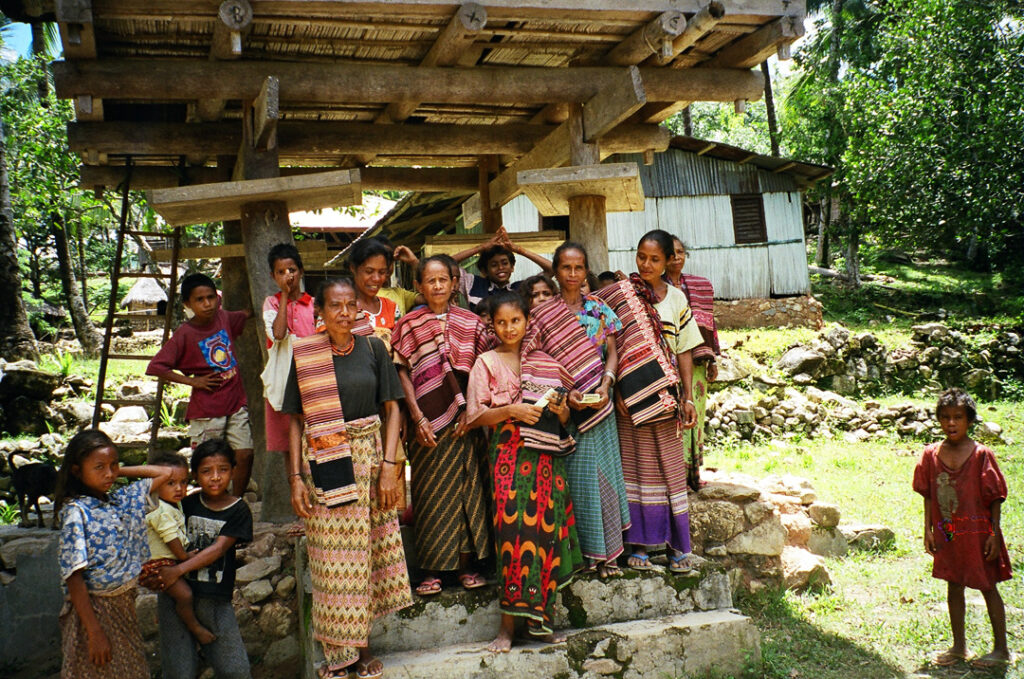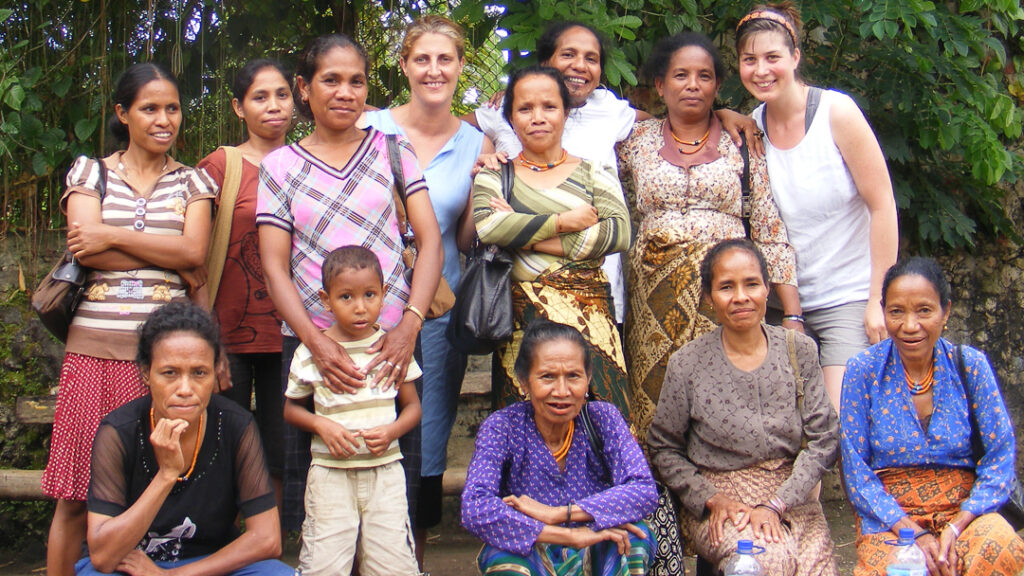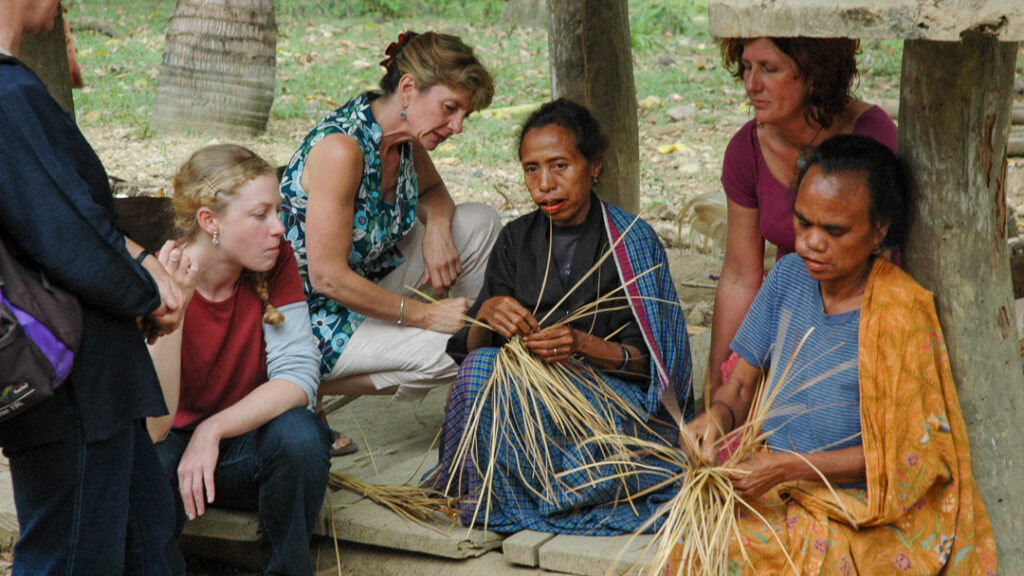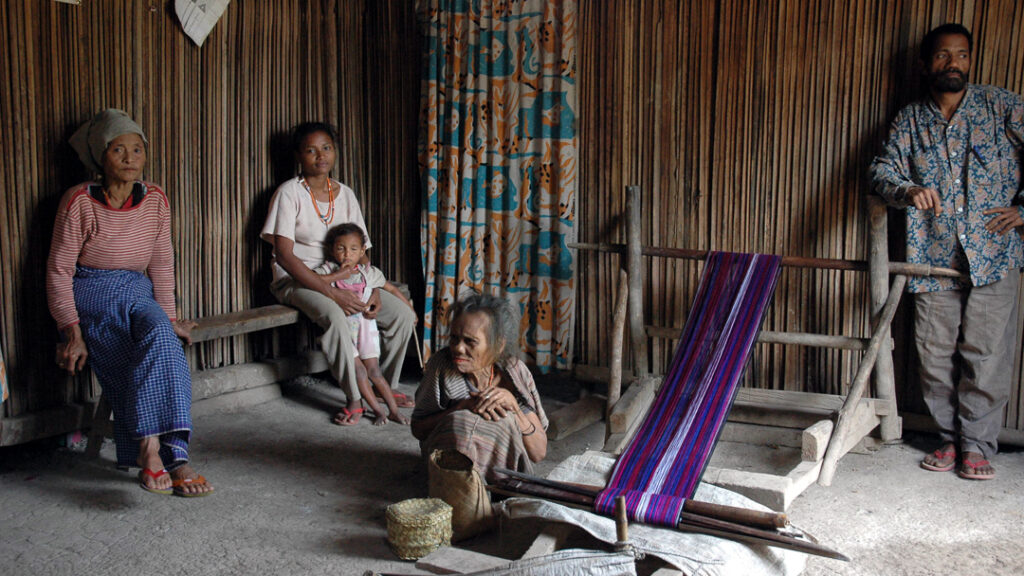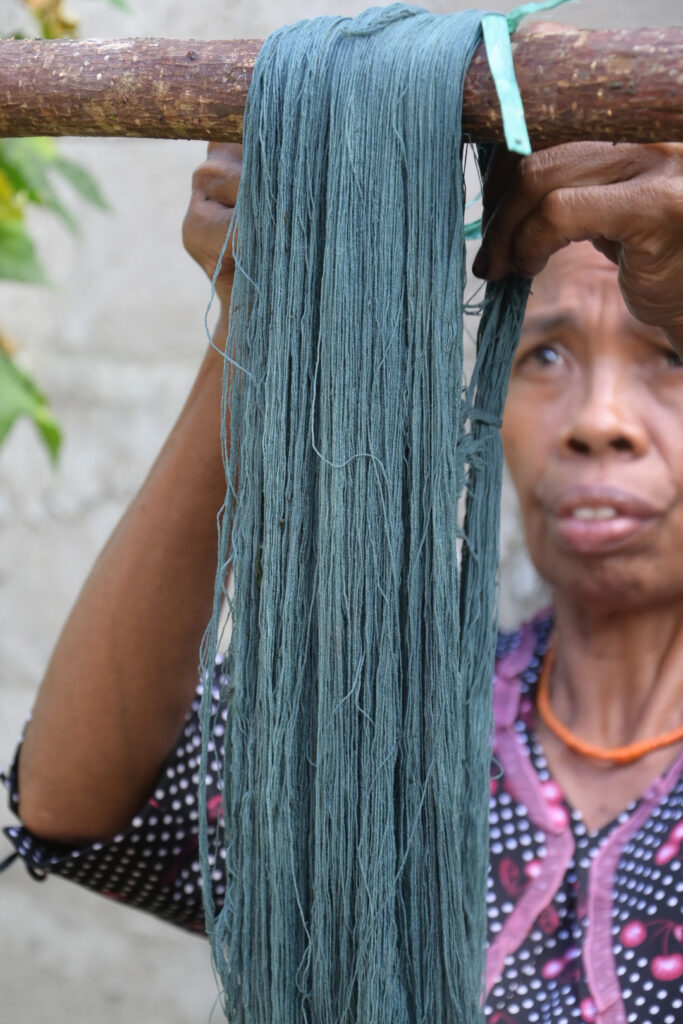Deb Salvagno recounts the first twenty years of the East Timor Women Australia association, helping support the young nation’s recovery through textiles.
East Timor Women Australia (ETWA) is a tiny volunteer not-for-profit in Melbourne. Founded in 2004, our mission is to support handweavers from LO’UD Cooperative. Today, LO’UD is Timor-Leste’s leader in sustainable weaving, creating textiles that blend tradition with contemporary elegance. Threads of unity, learning, and growth strengthen the fabric of our collective story.
Our journey started when we met LO’UD’s founding members in 2003, just four years into Timor-Leste’s recovery. As female resistance fighters, they started the cooperative to support veteran women and widows through handweaving. Their stories of occupation and roles in the resistance were powerful and moving, inspiring us to form ETWA to help them.
Our founding members were a group of Community Development students. Community development is a field of social work driven by principles of empowerment, human rights, and collective action. It aims to build on strengths rather than focus on weaknesses. This philosophy shaped our practice, building on the strengths of LO’UD’s traditional weaving skills to create beautiful handcrafts.
Fast-forward to September 19th, 2024, when we celebrated the opening of our exhibition, Tais Culture and Resilience: Woven Stories from Timor-Leste. The exhibition tells our story, LO’UD’s story, and Timor-Leste’s story through the lens of LOUD’s vibrant weaving culture and stunning photography. It is a testament to the power of collaborative arts to inspire, educate, and connect.
Our first five years were dedicated to establishing the financial and organisational foundations of the Cooperative and ETWA. Operating from our office at Ross House in Melbourne, our fundraisers and events were sometimes quirky but consistently impactful. We partnered with local organisations and spoke publicly at RSL and community events to highlight the Cooperative’s strengths. ETWA chapters sprang up in the Dandenong Ranges, Gippsland, and Darwin, where members organised events with Timorese communities and sold handcrafts at local markets, sending all profits to the Cooperative.
In Dili, the nation-building process was crowded with players implementing top-down development, which was challenging. We secured a small grant from a big donor, and the contract was draped with clauses and ‘must-dos’. The Cooperative’s leaders became passive observers rather than empowered participants, which was disappointing given their skills were honed on the frontlines of resistance. Tension emerged, and the Dili operation closed its doors in 2006.
However, in 2005, the Cooperative’s leaders established weaving groups in three rural communities in Iliomar and Lospalos. ETWA members attended the foundation meetings, and we were introduced to local weaving culture, giving us a window into their rich cultural heritage. Although poor in a monetary sense, communities were strong. ETWA’s engagement with the rural weaving groups was a learning curve. Unlike Dili, where modern organisational structures and decision-making were prominent, rural communities lived within traditional social structures steeped in culture, lore, and ritual. However, the weavers and community leaders turned to us for guidance, and this new ‘authority’ became a heavy responsibility. We began questioning our approach and how the community viewed us: were we donors or partners?
- Consultations Lospalos, 2010
- Weaving tour, 2007
- Iliomar, 2007.
2007 was a busy year. We moved to Borderlands Cooperative, joining a vibrant community of thinkers and ‘pracademics’, inspiring deep conversations and growth. Combining resources for impact and efficiency, we consulted with the weavers and conducted our first Weaving Tour, drawing visitors eager to learn about Timor-Leste’s weaving culture. We began work on our film Heru Ini Lafu Weaving Life to highlight LO’UD’s culture and stories. Our concurrent consultation with the weavers helped us understand their needs and introduced us to Fulidai-dai, a local practice of reciprocity essential in rural communities. The film, enhanced by ETWA member Sally Gray’s striking photography and support from Borderlands, helped us expand our community to over 200 passionate members and volunteers.
In 2009, we partnered with Australian Volunteers International, greatly enhancing our fundraising capabilities and facilitating an opening for a volunteer to work with the Cooperative. I applied, took the role and started working in Lospalos in July 2010, cultivating relationships with the weavers over the next two years. We developed a fair trade pricing framework honouring cultural nuances, making the Cooperative the only group in Timor-Leste to incorporate fair trade principles into its pricing. Tourist groups, ETWA, and many international volunteers visited and worked with us. Our co-design project, led by ETWA volunteer Kat Ashworth, resulted in a stunning collection of unique, naturally dyed, ethically produced textiles, creating a niche market honouring tradition and meeting contemporary demand. However, there were loads of trying times. An English-speaking representative from outside the Cooperative was appointed. This caused significant challenges as our goals and perspectives didn’t align; however, much was achieved. Through many meetings with the weavers, we learnt that their autonomy and culture held the seeds to support sustainability and preserve cultural processes. We became learners rather than teachers, turning to the notion of Fulidai-dai and exploring how to embed reciprocity into our relationship.
In 2013, the Cooperative adopted the name LO’UD, derived from the word lo’ut, meaning a call for community action. Under the new and dynamic leadership team of Ilda da Cruz and Amelia Fernandes, government land was secured to build a central workspace in Lospalos. With project management from the Dili-based enterprise Things and Stories and funding from ETWA and AusAid, the office was completed in 2018. This new space transformed LO’UD’s operations. The Cooperative management and membership grew in strength. Our role evolved to focus on supporting online marketing and sales and celebrating LO’UD’s achievements on our website. Using digital tools and a shared commitment, LO’UD grew, prospered and flourished. Many of the founding weavers are still involved. They pass on cultural knowledge and mentor younger weavers, seeking to balance their hunger for modernisation. Involving young women is a priority for LO’UD and their community of weavers.
In 2021, inspired by our film Heru Ini Lafu – Weaving Life and website, the Australian War Memorial commissioned Tais from LO’UD for their soon-to-be-opened Timor-Leste peacekeeping gallery. In 2023, Sally Gray and I visited LO’UD and gained insights into symbols and weaving language, enriching the commission and our exhibition.
On reflection, the success of the Tais Culture and Resilience: Woven Stories from Timor-Leste Exhibition and Symposium is deeply rooted in our unique relationship with LO’UD. Each tais holds a remarkable testimony of resilience, courage, and survival, a testimony to the enduring nature of this vital tradition despite successive occupations. This bond shaped the exhibition’s curation and exploration of literal, contextual, thematic, and layers of symbolic meaning.
Although challenging at times, our journey with LO’UD has been a privilege. Our grassroots philosophy didn’t attract significant donor funds or cooperation from the big NGOs, but we learned and achieved much without them. Importantly, LO’UD and ETWA set the agenda. Our complementary skills blended to create lasting friendships between women committed to preserving Timor-Leste’s woven arts and culture.
LO’UD is a mature, capable, stable, and visionary organisation that manages its operations transparently and independently. LO’UD’s succession plans and strategic vision will grow its membership and diversify its income to assist the poorest members of its weaving community. With a proven track record for continuous improvement and an incredibly prosperous and tightly governed community credit union credit, LO’UD can realise its vision with just a little financial assistance.
ETWA is raising funds for projects and programs to help LO’UD achieve more for their community. Volunteering with ETWA, donating, and purchasing textiles through our website is the most effective way to assist.
About Deb Salvagno
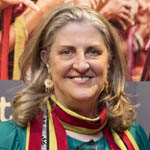 I’m Deb Salvagno, a textile artist from Melbourne, Australia, with experience in leather, fashion, and soft furnishings. My small business and community development expertise prepared me for leading community-driven startups. I speak Tetum, fostering the unique relationship between ETWA and the LO’UD Cooperative of weavers in rural Timor-Leste. I am passionate about the power of cultural arts to inspire, educate, and connect.
I’m Deb Salvagno, a textile artist from Melbourne, Australia, with experience in leather, fashion, and soft furnishings. My small business and community development expertise prepared me for leading community-driven startups. I speak Tetum, fostering the unique relationship between ETWA and the LO’UD Cooperative of weavers in rural Timor-Leste. I am passionate about the power of cultural arts to inspire, educate, and connect.

